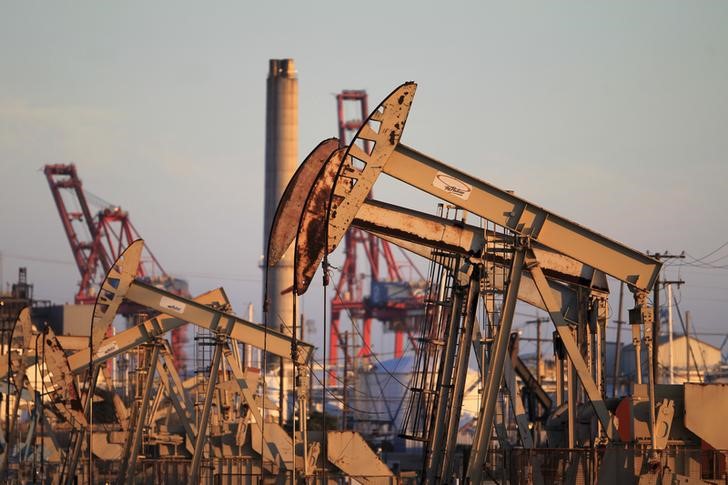© Reuters.
Investing.com– Oil prices fell on Wednesday, facing persistent pressure from a stronger dollar and uncertainty over U.S. interest rates, while underwhelming growth figures from top importer China also weighed on sentiment.
Still, bigger losses in crude were held back by persistent concerns over disruptions to Middle East supplies, as military action in the region escalated.
China’s economy grew in the fourth quarter, as the world’s largest oil importer continued to grapple with a sluggish post-COVID recovery.
While still beat a 5% government target for 2023, the rise was largely driven by a lower base for comparison from 2022, when the economy grew about 3%.
Wednesday’s reading set a weak tone for Chinese economic growth in 2024, which spells a weaker appetite for crude in the coming months. While Chinese oil imports still hit record highs in 2023, their pace of growth was seen slowing towards the end of the year, amid high inventory levels.
expiring in March fell 0.5% to $77.93 a barrel, while fell 0.7% to $72.02 a barrel by 21:09 ET (02:09 GMT).
Dollar strength dents crude amid rate-cut uncertainty
Strength in the also weighed on oil prices, as the greenback raced to a one-month high after Federal Reserve officials downplayed expectations for early rate cuts by the central bank.
Fed Governor Christopher Waller said that the bank was in no hurry to cut interest rates early, given that the U.S. economy remained relatively resilient in the near-term.
A stronger dollar hurts demand by making crude more expensive for international buyers. The prospect of higher-for-longer rates also presents a weaker outlook for oil demand, given that economic activity usually cools in a high-rate environment.
Focus is now on U.S. and data, due later in the day, for more cues on the world’s largest economy.
Red Sea tensions remain in play
Still, bigger losses in crude were limited by the prospect of supply disruptions in the Middle East, as military action in the region escalated.
U.S. and UK forces confirmed a new strike against the Iran-aligned Houthi group in the Red Sea, while the Houthis vowed to continue targeting ships in the region. This came as the Israel-Hamas war- which the Houthis have cited as the main motivation for their recent strikes, continued to rage on.
Disruptions in the Red Sea saw several shipping operators steer clear of the region and instead take a longer route around the Cape of Good Hope- which is expected to delay oil deliveries to Europe and Asia.
The Middle East conflict was a key point of support for oil prices over the past two months, as traders positioned for tighter European and Asian markets due to the disruptions.
But traders were now seeking clearer signs that the conflict was limiting supplies, given that the U.S. and several members of the Organization of Petroleum Exporting Countries were seen increasing production in December.
Oil prices fell about 10% in 2023 as concerns over slower demand outweighed any potential reductions in supplies. Production cuts by the OPEC had largely underwhelmed markets, with crude supplies now set to be less tight than initially anticipated in early-2024, barring any more disruptions in the Middle East.
U.S fuel demand was also seen weakening substantially, with and inventories logging strong builds for the past two weeks.
Weekly U.S. inventory data is due later on and .
Upgrade your investing with our groundbreaking, AI-powered InvestingPro+ stock picks. Use coupon INVSPRO2024 to avail a limited time discount on our Pro and Pro+ subscription plans. Click here to know more, and don’t forget to use the discount code when checking out!
Read the full article here

